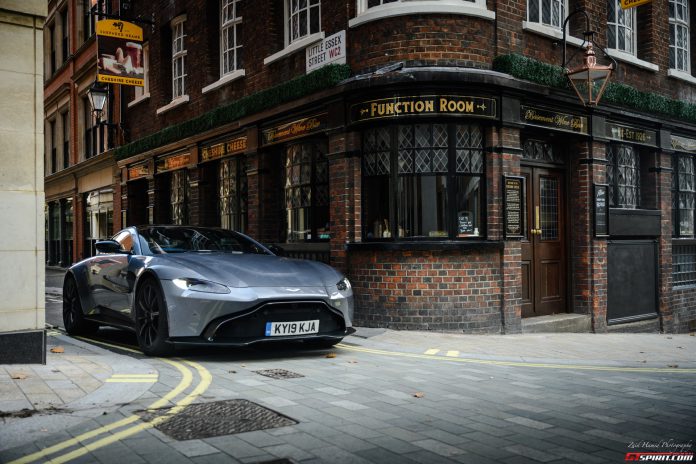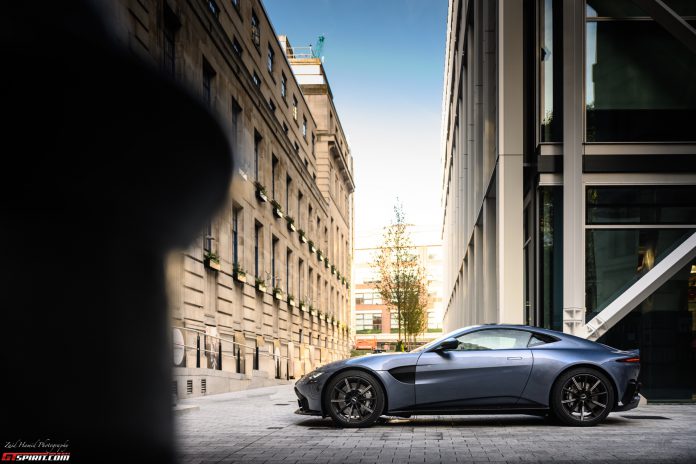For decades the Porsche 911 has been the yardstick, the go to car for the affluent man or woman that fancies a great sports car that can thrill on the weekend and, if they so choose, trundle through commuter traffic without fuss or issue in the week. The formula has remained the same too – flat six at the back a couple of seats for the little ones just ahead of the engine a manual or auto transmission in the middle and a reasonably sized boot/frunk at the front. Buying a 911 is a no brainer, they hold value as a result of the ludicrous demand, they are almost all a joy to drive and they are as reliable as a Volkswagen Golf. Few challengers have come and gone, even fewer have the lineage or provenance of the 911 and few are as accomplished all rounders.
An Aston Martin would normally not cross a Porsche 911 buyers mind, the previous generation 2005-2018 Vantage was often considered a competitor. In reality there was a signifiant gulf between the two not only in abilities, but also the ownership experience. That all changed with the introduction of this, the latest generation Vantage. Why the sudden change? Well, the partnership with Mercedes-AMG brought a tried and tested, modern V8. The partnership extended to the infotainment system that was always a point of criticism in Astons of old. These updates significantly boosted the appeal of the Vantage, it started to catch buyers attention. Then the media drove the Vantage on road and track and the rave reviews did wonders for the credibility of the Vantage.
Here I am, in Q4 2019 having recently driven the Porsche 992 911 Carreras in S and 4S guises, both as coupes and cabriolets. I find myself somewhat well placed to draw comparisons with the Vantage that has just been delivered on my driveway. Styling is subjective, but it cannot be denied that the gaping Vulcan like front grill, dramatic taught lines and wide rear haunches provide a visual punch that knockout the subtle, stylish and suited Porsche. These cars are visually sending out different messages.
The same can be said for the interior, the 992 is clean, sharp, functional. The Aston is, again, a lot more dramatic with its button festooned square steering wheel. The dash is also littered with buttons and the gear selector is not a conventional stick, but the buttons that Aston have used for a number of years. The British contender lacks rear seats – for the few that shoehorn their children in the back seat or use them as extra storage space, this may be a dealbreaker. On the topic of space, there is no glovebox in the Aston.

Onto the engines. Once again, this is a story of contrasts. For cars that share a target audience, this is the biggest difference. Front mid engined V8 plays rear engined flat six. Both are turbocharged and both are available with auto and manual gearboxes. Start them up and another sensory contrast makes itself known – sound. This, for me, is a significant differentiator. The 992 sounds the same way as it looks, smooth and sophisticated. It turns heads but does not snap necks. The Aston does the latter, the V8 with the sports exhaust is rude on startup and in Sport+ or Track mode, it warbles like an old school V8, then splatters, bangs and howls as you push on. The whip cracks on up shifts and gun shots on downshifts are a far cry from the 911s image. The relation to the Mercedes-AMG’s noises is there, but the Aston is far more brutal, raucous and hard-edged. It is different enough.
The sounds accompanying the gearshifts may be entertaining, the shifts themselves from the ZF eight-speed cannot match the finesse and scarcely believable speed of the PDK box. The Aston’s steering is not hyper fast as many cars on sale today, but it does lack precious feel. Given that it is the first time Aston has adopted an EPAS system, it is fair to say that it will improve in the future as Porsche’s did.
The Aston wins on power, 503bhp vs a Carrera S with 450. 0-100 times are very similar, both will hit the measure in the mid threes according to their press releases. Porsche, as per, are conservative and in the real world would leave the Aston behind from a standing start.
As a daily driver the Vantage is fantastic. Around the congested London streets it is comfortable, the steering is light, the ride supple and the seats are comfortable. The brake pedal is a touch too sensitive but adjusted modulation over time alleviates this, a little more travel would be an improvement as would a glovebox. I suspect the reason for their being a lack of glovebox is the engine being situated so far behind the front axel, the dash itself is quite high. This means there is a sporty post box like view out of all the windows. Racy, not very good for general visibility. The blindspot from the wing mirror position also takes some getting used to.
The comparisons on tangible elements are all good and well. The majority of measures swing towards the 911, particularly when you consider the Carrera S is around £20,000 less than the Vantage. Then you turn to how the cars make you feel and this is where the Aston sets itself up fabulously. Could you imagine James Bond driving a 911? No. The feeling of rarity, bonafide specialness is part and parcel of owning an Aston Martin. If you drive through London you’ll need an abacus to keep count of the 911s that you’ll cross paths with in just an hour around Kensington and Mayfair. Vantages are far rarer, they command attention, something only the most hardcore 911s can do. This may sound trivial, but to me, and I suspect a genuine sports car owner, the way the car make you feel is taken into consideration. Mute the head and focus on the heart and there is a gulf separating the Porsche and the Aston, the Aston gives you this warm happy feeling that is a charm that few competitors possess.
It cannot be denied that the 911 is more accomplished in its abilities, in equal measure anyone considering a 911 would be foolish not to get behind the wheel of the Vantage, it is a fine machine and one that might just charm them off of their feet, perhaps for the drama and noise alone.

